|
Genres, Themes, Actors, and Directors:
- Farming
- Gene Kelly Films
- Hans Conried Films
- Judy Garland Films
- Let’s Put On a Show!
- Musicals
Review:
Summer Stock is primarily remembered for its notoriety as the film which ended Judy Garland’s career at MGM. Read any review or write-up on the movie, and you’ll learn all you need to know about the sad details surrounding Garland’s ongoing addiction, stint in rehab, 20-pound weight gain (leading to the oddity of a “show-stopping” finale number added several months after primary filming, at which point she’d clearly lost the weight), and overall struggles to make it to the set each day; you’ll also read about Kelly’s kindness in helping her through the ordeal (including faking a fall one day to allow her to take the day off). Ultimately, however, what really “matters” is whether the film succeeds or not — and critical opinions remain deeply divided on this point.
DVD Savant, for instance — while acknowledging the redeeming power of the musical numbers — argues that the plot’s “mechanics are even simpler than shows like Babes on Broadway: Save the farm, put on a show, ditch the loser love interests so the leads can get together”, and points out the “lazy way the… script abuses the supporting players” so that “amusing personality Eddie Bracken and so-so MGM contract player Gloria DeHaven both play unfunny, unpleasant jerks so as to make Garland and Kelly seem all the more virtuous for dumping them”. In his laudatory review for Digitally Obsessed, however, David Krauss argues that the “snappy script… somehow makes the tired backstage story seem fresh”, and that “the colorful characters and brisk pacing (care of director Charles Walters, who also helmed Easter Parade) keep us fully engaged at all times”.
In truth, I’m more in agreement with DVD Savant than Krauss on this debate; the cliched storyline is a bit too escapist for my blood (sorry, but nothing about Garland’s attempt to fill farming shoes “worked” for me) — and while I didn’t have much of a problem with DeHaven as Garland’s spoiled sister (or Bracken as her spineless fiance), the presence of Phil Silvers as Kelly’s irritating sidekick was simply cringe-worthy throughout. With all that said, the film is at least partially redeemed by a host of rousing musical numbers, as well as truly top-notch performances by both Garland and Kelly; whatever troubles Garland may have been having behind the scenes are (amazingly) nowhere in evidence on-screen. While only her stunning finale number (“Get Happy”) is memorable enough to stick in your head for days afterwards, the remaining songs are all enjoyable while they last, and perfectly suited for Garland’s timbre. Meanwhile, Kelly gets to dance one of his best, most creative numbers (and that’s saying a lot!) as he shuffles away on a wooden floor, engaging a newspaper for sound effects. It’s fun stuff.
Redeeming Qualities and Moments:
- Judy Garland as Jane

- Gene Kelly as Joe
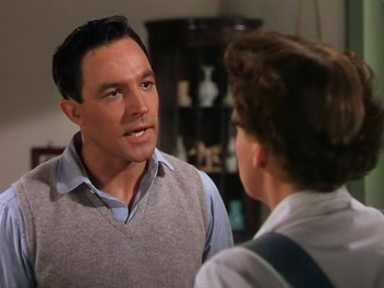
- Kelly and Garland dancing the Portland Fancy
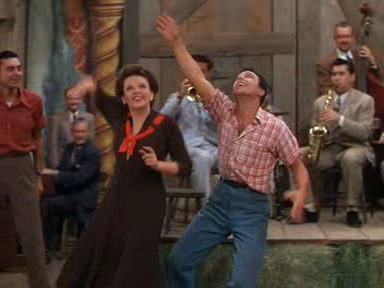
- Kelly’s truly classic solo tap-dance sequence
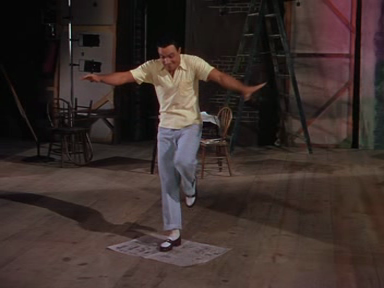
- Garland’s justifiably famous “Get Happy” finale
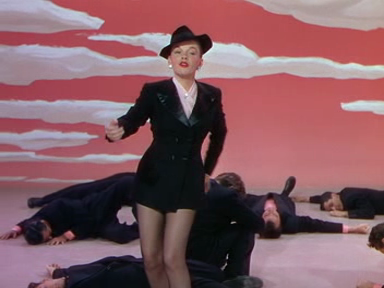
Must See?
No. While certainly recommended, this one is only must-see for Garland or Kelly completists.
Links:
|
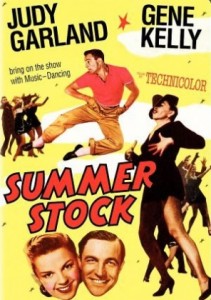





One thought on “Summer Stock (1950)”
Not a must.
Watching ‘SS’ again, I almost sense how it, at least in part, contributed to Garland’s breakdown. It’s a bad movie. Or let’s say it’s a desperate attempt at very safe, colorful, family entertainment. But to me, ‘bad movie’ is closer to the truth. I can imagine Garland somewhat seething inside at having to – again – do a variation on something she had down times over.
(There’s a scene in the Garland biopic with Judy Davis that backs that up. Note the scene in which the actor playing Vincente Minnelli talks Garland into playing the lead in ‘Meet Me in St. Louis’. Davis’ Garland points out that she already knows the character she’s being asked to play quite well…cause she keeps playing different versions of the same type.)
I would imagine Garland might have forgiven TONS in the making of ‘SS’ if it had a good score. It doesn’t. The songs are functional – if mostly paeans to the down-home, Midwestern lifestyle. ‘Get Happy’ (by the terrific team of Harold Arlen and Ted Koehler) is one of only two (out of over ten) songs not written by the film’s main writing team. I can almost hear Garland begging someone-in-charge, ‘Please, one good song! Give me one good song in this thing!’ She got one. She got ‘Get Happy’. And it’s served up marvelously well.
But you don’t have to sit through all of ‘SS’ to see it. The way things are now, that sequence is probably on YouTube.
Yes, it’s always nice to see Kelly dance (even if most of what he does here is a bit familiar). Garland and Kelly have an engaging dance duet (even if it’s not particularly original). And, yes, he does a pretty good job with the newspaper. But the movie, overall, is a real drag to get through. It does its best to dwarf its good points.
If I had been Garland, it might have driven me half-mad, too.
It makes perfect sense that, when Garland returned to the big screen four years later, it would only be with something much more worthy of her talent: ‘A Star is Born’.